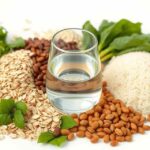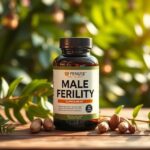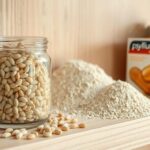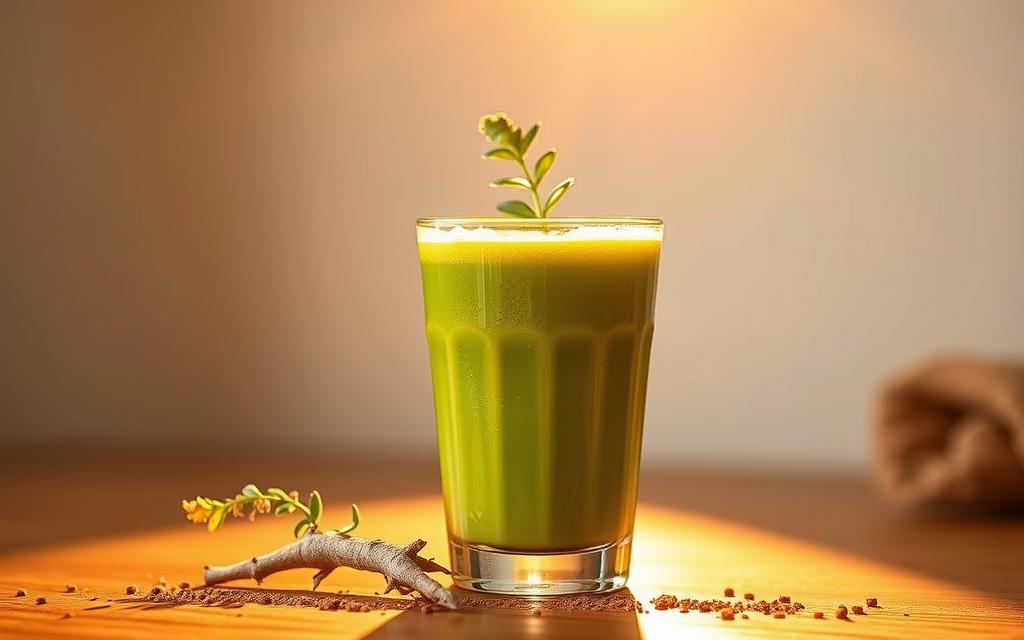7 Best Foods to Increase Fertility (Backed by Science)
If you’re trying to conceive, you might be surprised to learn that your diet plays a crucial role in your fertility journey. Research shows that specific nutrients can significantly impact hormonal balance, egg and sperm quality, and overall reproductive health. While diet alone can’t solve all fertility challenges, incorporating certain foods to increase fertility can create an optimal environment for conception.
In this evidence-based guide, we’ll explore seven powerful fertility-boosting foods backed by scientific research. Whether you’re just starting your family planning or have been trying to get pregnant for some time, these nutritional powerhouses may help improve your chances of conception naturally.
The Connection Between Diet and Fertility

Your body requires specific nutrients to maintain optimal reproductive function. According to a 2018 study published in Frontiers in Public Health, diet quality directly impacts fertility in people of all genders. Researchers found that a balanced intake of proteins, healthy fats, complex carbohydrates, and micronutrients creates the ideal foundation for reproductive health.
The foods you eat affect hormone production, egg and sperm quality, and even implantation. For women, proper nutrition supports regular ovulation and creates a nourishing environment for a potential pregnancy. For men, diet influences sperm count, motility, and morphology – all critical factors in male fertility.
Let’s explore the seven most powerful foods to increase fertility, all backed by scientific evidence.
1. Leafy Green Vegetables

Why They Boost Fertility
Dark leafy greens like spinach, kale, and Swiss chard are fertility powerhouses packed with essential nutrients that support reproductive health. These greens are rich in folate (the natural form of folic acid), iron, calcium, and antioxidants – all crucial for fertility.
Folate deserves special attention when discussing foods to increase fertility. A study in Fertility and Sterility found that women with higher folate intake had significantly improved chances of conception compared to those with lower intake. Folate also helps prevent neural tube defects in early pregnancy.
Key Nutrients
- Folate: Supports ovulation and creates a healthy environment for implantation
- What Foods Improve Male Fertility: Fertility-Boosting Foods
- Iron: Prevents anemia, which is linked to ovulation problems
- Antioxidants: Combat oxidative stress that can damage egg cells
- Vitamin E: Improves endometrial lining thickness
How to Include in Your Diet
Add a handful of spinach to your morning smoothie, create a kale salad for lunch, or sauté Swiss chard as a dinner side dish. Aim for at least one cup of leafy greens daily to maximize their fertility-boosting benefits.
2. Fatty Fish

Why It Boosts Fertility
Fatty fish like salmon, sardines, and mackerel are among the most effective foods to increase fertility due to their rich omega-3 fatty acid content. These essential fats play a crucial role in reproductive health for both partners trying to conceive.
Research published in the Journal of Human Reproduction found that couples who consumed more omega-3 fatty acids had a significantly higher probability of conception than those with lower intake. For men, omega-3s improve sperm quality, count, and motility.
Key Nutrients
- Omega-3 fatty acids: Reduce inflammation and regulate hormones
- Vitamin D: Supports ovarian health and sperm production
- Selenium: Protects eggs and sperm from oxidative damage
- High-quality protein: Provides building blocks for hormone production
How to Include in Your Diet
Aim to eat fatty fish 2-3 times per week. Opt for wild-caught salmon when possible, as it typically contains higher levels of omega-3s than farm-raised varieties. If you don’t enjoy fish, consider a high-quality fish oil supplement after consulting with your healthcare provider.
3. Berries

Why They Boost Fertility
Berries are antioxidant powerhouses that protect reproductive cells from oxidative damage. Blueberries, strawberries, raspberries, and blackberries contain anthocyanins and other flavonoids that have been shown to improve fertility outcomes.
A study in Fertility and Sterility found that women who regularly consumed high-antioxidant foods like berries had better egg quality and higher fertilization rates during fertility treatments. The antioxidants in berries also help protect sperm from damage.
Key Nutrients
- Antioxidants: Combat cellular damage to eggs and sperm
- Vitamin C: Supports hormone production and improves sperm quality
- Folate: Essential for early embryo development
- Fiber: Helps maintain healthy blood sugar levels
How to Include in Your Diet
Add a cup of mixed berries to your breakfast, enjoy them as a snack, or blend them into a fertility-boosting smoothie. Fresh or frozen berries both provide excellent nutritional benefits. Aim for at least 1-2 servings daily when trying to get pregnant.
4. Full-Fat Dairy

Why It Boosts Fertility
Contrary to popular low-fat diet advice, research suggests that full-fat dairy products may actually improve fertility. The Nurses’ Health Study, one of the largest investigations into women’s health, found that women who consumed full-fat dairy products were less likely to experience ovulation-related infertility than those who opted for low-fat versions.
Scientists believe this fertility benefit comes from the fat-soluble vitamins and specific fatty acids found in full-fat dairy that support reproductive hormone production. These components are often removed during the processing of low-fat dairy products.
Key Nutrients
- Vitamin D: Essential for hormone regulation and implantation
- Calcium: Supports egg maturation and follicle development
- Conjugated linoleic acid (CLA): May improve ovarian function
- Protein: Provides building blocks for reproductive tissues
How to Include in Your Diet
Choose organic, grass-fed dairy products when possible, as they contain higher levels of beneficial nutrients. Enjoy a serving of full-fat yogurt with berries for breakfast, add cheese to your lunch, or have a glass of whole milk as an afternoon snack. Aim for 1-2 servings daily.
5. Nuts and Seeds

Why They Boost Fertility
Nuts and seeds are among the most nutrient-dense foods to increase fertility, packed with essential fatty acids, protein, and micronutrients. Walnuts, in particular, have been extensively studied for their fertility benefits in people of all genders.
A study published in Biology of Reproduction found that men who consumed 75 grams of walnuts daily for 12 weeks showed improved sperm vitality, motility, and morphology. For women, the selenium in Brazil nuts and the zinc in pumpkin seeds support egg quality and hormonal balance.
Key Nutrients
- Omega-3 fatty acids: Support hormone production and reduce inflammation
- Selenium: Protects eggs and sperm from oxidative damage
- Zinc: Essential for ovulation and testosterone production
- Vitamin E: Improves endometrial response
How to Include in Your Diet
Enjoy a small handful (about 1/4 cup) of mixed nuts daily as a snack. Add ground flaxseeds or chia seeds to smoothies, oatmeal, or yogurt. Sprinkle pumpkin seeds on salads or roast them for a crunchy snack. Variety is key to getting the full spectrum of fertility-boosting nutrients.
6. Legumes

Why They Boost Fertility
Legumes like lentils, chickpeas, and beans are excellent plant-based protein sources that support fertility. They’re rich in fiber, which helps regulate blood sugar and maintain healthy hormone levels – both crucial factors when trying to get pregnant.
Research from the Harvard School of Public Health suggests that replacing animal protein with plant protein sources like legumes may reduce ovulatory infertility risk. Legumes also contain folate, which is essential for preventing neural tube defects in early pregnancy.
Key Nutrients
- Plant protein: Supports hormone production without excess saturated fat
- Folate: Critical for cell division and early embryo development
- Iron: Prevents anemia and supports ovulation
- Fiber: Helps maintain healthy blood sugar and hormone levels
How to Include in Your Diet
Add chickpeas to salads, enjoy lentil soup for lunch, or make a bean-based dinner once or twice a week. If you’re new to legumes, start with smaller portions and increase gradually to avoid digestive discomfort. Aim for 3-4 servings weekly when trying to conceive.
7. Avocados

Why They Boost Fertility
Avocados are one of the most nutrient-dense foods to increase fertility, packed with monounsaturated fats, potassium, folate, and vitamin K. These creamy fruits provide essential nutrients that support reproductive health and hormone balance.
The monounsaturated fats in avocados help regulate insulin sensitivity and reduce inflammation, creating an optimal environment for conception. A study in the International Journal of Food Sciences and Nutrition found that avocados contain unique plant sterols that can block estrogen absorption and boost progesterone – helping maintain the hormonal balance needed for fertility.
Key Nutrients
- Monounsaturated fats: Support hormone production and reduce inflammation
- Folate: Essential for cell division and early embryo development
- Potassium: Helps regulate fluid balance and blood pressure
- Vitamin K: Supports implantation and early pregnancy
How to Include in Your Diet
Enjoy half an avocado daily on toast, in salads, or blended into smoothies. Their creamy texture makes them versatile for many dishes. Choose avocados that yield slightly to gentle pressure for perfect ripeness.
Additional Tips to Enhance Your Fertility Diet

While incorporating the seven foods above can significantly boost your fertility, these additional lifestyle factors can further enhance your chances of conception:
Foods to Limit or Avoid
Consider Reducing:
- Processed foods high in trans fats
- Refined carbohydrates and sugary treats
- Excessive caffeine (more than 200mg daily)
- Alcohol (especially when actively trying to conceive)
- High-mercury fish (shark, swordfish, king mackerel)
Hydration and Fertility
Proper hydration is essential for fertility. Water helps transport hormones, flushes toxins, and supports cervical mucus production – all important for conception. Aim for 8-10 glasses of water daily, and limit sugary beverages and excessive caffeine.
Maintain a Healthy Weight
Both underweight and higher weight conditions can impact fertility. Research shows that achieving a healthy BMI can improve ovulation and pregnancy rates. If weight is a concern, consult with a healthcare provider for personalized guidance rather than attempting extreme diets.
Supplement Wisely
While whole foods should be your primary source of nutrients, certain supplements may be beneficial when trying to conceive. A high-quality prenatal vitamin containing folate (not synthetic folic acid) is recommended for women planning pregnancy. Men may benefit from zinc and selenium supplements if deficient.
Creating Your Personalized Fertility Diet Plan
Incorporating these seven powerful foods to increase fertility into your daily diet can create an optimal environment for conception. Remember that consistency is key – the benefits of a fertility diet accumulate over time, typically taking three to six months to significantly impact reproductive health.
While diet plays a crucial role in fertility, it’s important to recognize that nutrition is just one piece of the puzzle. If you’ve been trying to conceive for over a year (or six months if you’re over 35), it’s advisable to consult with a fertility specialist alongside making dietary changes.
Ready to optimize your fertility journey?
Speak with a reproductive health specialist who can provide personalized guidance based on your unique health profile and fertility goals.
Remember that the journey to parenthood is unique for everyone. By nourishing your body with these fertility-boosting foods and working with healthcare professionals when needed, you’re taking proactive steps toward your goal of starting or expanding your family.













This article highlights the significant role of diet in enhancing fertility, emphasizing the importance of specific nutrients for both men and women. It’s fascinating how foods like spinach, kale, and Swiss chard can positively impact reproductive health. The inclusion of scientific studies adds credibility to the recommendations provided. Incorporating these fertility-boosting foods into daily meals seems like a practical and natural approach to improving conception chances. How long does it typically take to see noticeable improvements in fertility after adjusting one’s diet? Given the growing economic instability due to the events in the Middle East, many businesses are looking for guaranteed fast and secure payment solutions. Recently, I came across LiberSave (LS) — they promise instant bank transfers with no chargebacks or card verification. It says integration takes 5 minutes and is already being tested in Israel and the UAE. Has anyone actually checked how this works in crisis conditions?